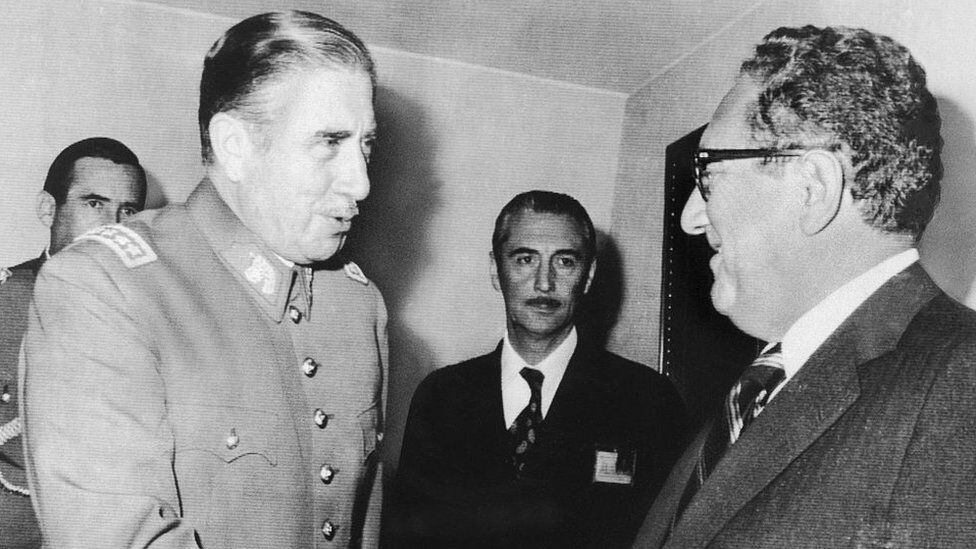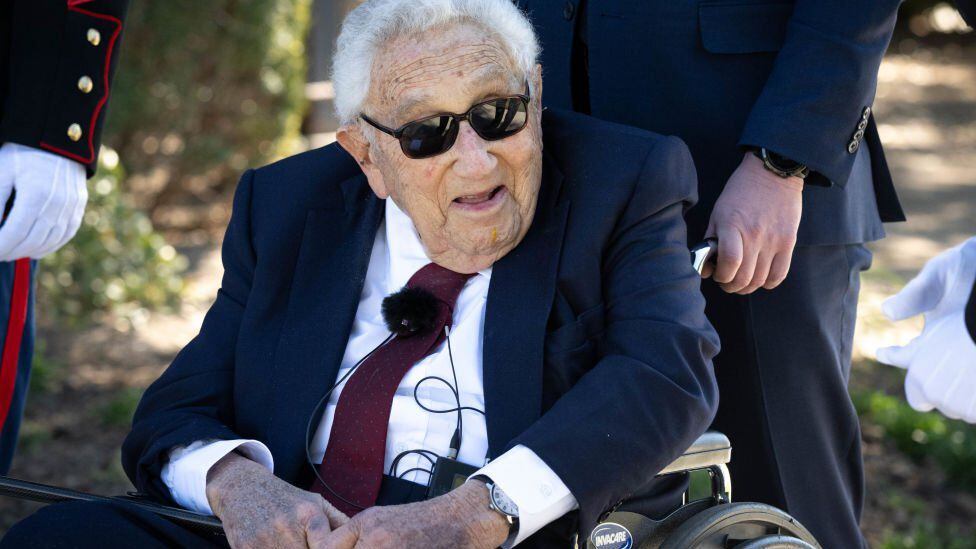When henry kissinger In June 1976, he met with the foreign minister of the military regime that three months before had come to power in Argentina. The latter asked him if he minded if he spoke Spanish because he had difficulties with English.
“Not at all”, responded Kissinger, then Secretary of State of the United States and chess player on the world board, before breaking the ice with his Argentine interlocutor announcing that he would attend the 1978 World Cup in his country, “whatever happens”. .
LOOK: Why New York is sinking
“Argentina is going to win,” he predicted.
The foreign minister, Admiral César Augusto Guzzetti, warned him moments later that his country had “terrorism” and economic problems, and asked for US support for the de facto government.
“We have closely followed events in Argentina. We wish the new government the best and will do everything possible to help it succeed,” Kissinger responded, according to a declassified US document on the conversation, which took place. place in Chile under the dictatorship of Augusto Pinochet.
Soon after, Kissinger gave Guzzetti another heads-up: “If there are things that need to be done, they should be done quickly.. But they must quickly return to normal procedures,” he told him in a sentence that his critics have interpreted as a green light for the new Argentine regime to violate human rights.
With these kinds of messages and policies, both in Latin America and in the rest of the world, the US promoted its interests in the midst of the Cold War through Kissinger, one of the most influential and controversial diplomats of the 20th century who is celebrating his birthday this Saturday. 100 years.
a paradoxical figure
As an American foreign policy strategist during the turbulent 1960s and 1970s, Kissinger wielded enormous power.
His name has been associated with almost all the great events of those times, from the Vietnam War to the US confrontation with the Soviet Union.
The paradoxes of his life were extraordinary.
Despite being a controversial protagonist of the Cold War, in 1973 he was awarded the Nobel Peace Prize.
Sometimes identified with the anti-communist rightwas nevertheless the ideologue of the rapprochement between the US and China, until then isolated under the Mao Zedong regime.
And despite being born in Germany and speaking English with a thick foreign accent, he became one of the best-known symbols of Washington and its global power.
the pragmatist
Henry Alfred Kissinger was born in Fürth, in German Bavaria, on May 27, 1923, into a Jewish family who fled Nazi persecution by moving to New York when he was 15 years old.
In 1943, the same year he became a US citizen, he was drafted into the US military and became a German counterintelligence interpreter during World War II.
After the war, he returned to the US and entered the exclusive Harvard University on a scholarship, where in 1950 he graduated in Political Science with all honors. He earned master’s and doctorate degrees, and in 1954 became a professor.
His good academic reputation allowed him to enter the great halls of politics when President Richard Nixon appointed him his National Security Advisor in 1969 and Secretary of State in 1973.
The veteran Republican politician and the Harvard intellectual formed a couple that marked US foreign policy with a series of unexpected and daring initiatives.

Kissinger defended decision-making based on pragmatism and national convenience rather than on the basis of ideological preferences.
Among other things:
However, his critics point out that he was responsible for atrocities such as secret US air raids in Cambodia, a nation he accused of harboring communist guerrillas from neighboring Vietnam.
But Kissinger is a controversial figure not only because of his role in US foreign policy, but also because of his personality.
“I had that kind of cold-blooded and calculating approach to war and peace“, said David Greenberg, author of the book “Nixon’s Shadow: The Story of an Image.”
He had “all this intelligence, but without the moral or ethical foundation,” he added.
Allende and Fidel
Latin America, where the Cold War often turned into a hot conflict, was one of the regions that saw Kissinger’s influence firsthand.
This has been evidenced by various official documents declassified and published by the National Security Archive at George Washington University.
Those papers show, for example, that Kissinger indicated to Nixon in 1970 that the democratic election of Chilean socialist president Salvador Allende was “one of the most serious challenges ever faced in this hemisphere.
Kissinger feared the South American country would become an example of a “successful elected Marxist government” and told CIA director Richard Helms that Washington would prevent “Chile from going to waste.”

Days after Allende was overthrown by Pinochet in 1973, Kissinger spoke to Nixon by phone about the military coup: “We didn’t do it. I mean, we helped them,” he told the president.
“We want to help, not weaken it. You did a great service to the West by overthrowing Allende“Kissinger told Pinochet personally in June 1976, when he was already Gerald Ford’s Secretary of State after Nixon’s resignation over the Watergate scandal.
That meeting took place in Chile, when worldwide concern was growing about the serious violations of human rights by the Chilean regime.
It was on that same trip that Kissinger met Argentine Foreign Minister Guzzetti and conveyed his support to the de facto government that launched a “dirty war” in which up to 30,000 people would die or disappear.
Other declassified US documents show that Kissinger, furious at then-Cuban President Fidel Castro’s decision to send troops to Angola, outlined in 1976 plans to “crush Cuba” with air strikes, which never came to fruition.
no apologies
After his departure from government in 1977, when Democrat Jimmy Carter became president of the United States, Kissinger founded the international consulting firm Kissinger Associates, which made millions selling advice to large corporations.

He also devoted himself to another of his passions, soccer, and as he had announced to Guzzetti, he personally traveled to the 1978 World Cup in Argentina despite concerns expressed by the US ambassador to that country that his support for the military junta hardened its stance on human rights, just as the Carter administration was pressuring it to stop the repression.
Kissinger never entirely escaped the controversies he aroused.
In May 2001, while visiting Paris, a French judge summoned him to testify as a witness in an investigation into the coup and human rights violations in Chile, but the former Secretary of State refused to answer and left France.
There were also attempts to involve him in prosecutions in other countries for alleged abuses related to US foreign policy, but those efforts never came to fruition.
Consulted in an interview with The Atlantic in 2016 about the usefulness of going to other countries and making mea culpa for US behavior in the past, Kissinger used questions in his response, without offering a hint of an apology.
“Should every American public servant have to worry about how their views will sound 40 years later in the hands of foreign governments?” he questioned.
When recently a journalist from the US network CBS Asked about the bombing of Cambodia, Kissinger defended himself: “You’re doing this show because I’m turning 100,” he said. “And you choose a subject of something that happened 60 years ago. You have to know that it was a necessary step“.
Until today he remains active and informed on international issues, despite having undergone several heart surgeries.
In that same recent interview, he said he hoped that, with the participation of China, there would be negotiations by the end of this year to end the war between Russia and Ukraine.
And in dialogue with the British magazine The Economist He launched advice for the US and China to learn to live together without going to war, in a world where artificial intelligence can increase their rivalry. “Both parties became convinced that the other represents a strategic danger,” he warned. “We are headed for a great power confrontation.”
But on this birthday, Kissinger is not only notorious for his current outlook on the world, but above all for how he acted when he had power in his hands.
Source: Elcomercio
I am Jack Morton and I work in 24 News Recorder. I mostly cover world news and I have also authored 24 news recorder. I find this work highly interesting and it allows me to keep up with current events happening around the world.

:quality(75)/cloudfront-us-east-1.images.arcpublishing.com/elcomercio/KDJSPBSRHZEYPIFY3L2SCLD234.jpg)

:quality(75)/cloudfront-us-east-1.images.arcpublishing.com/elcomercio/3S4ZFY2KJFBUJFHRIARFHCTZ6Y.jpg)
:quality(75)/cloudfront-us-east-1.images.arcpublishing.com/elcomercio/X6YAWAFREBEPTJYPJGCVOWL3LM.jpg)
:quality(75)/cloudfront-us-east-1.images.arcpublishing.com/elcomercio/KEUASNGDRFBJFC7HCSINB4Q3WA.jpg)

